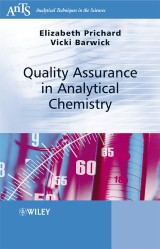Details

Quality Assurance in Analytical Chemistry
Analytical Techniques in the Sciences (AnTS), Band 25 1. Aufl.
|
63,99 € |
|
| Verlag: | Wiley |
| Format: | |
| Veröffentl.: | 27.09.2007 |
| ISBN/EAN: | 9780470517765 |
| Sprache: | englisch |
| Anzahl Seiten: | 316 |
DRM-geschütztes eBook, Sie benötigen z.B. Adobe Digital Editions und eine Adobe ID zum Lesen.
Beschreibungen
<p><b>The issue of quality assurance in the analytical chemistry laboratory has become of great importance in recent years.</b></p> <p><i>Quality Assurance in Analytical Chemistry</i> introduces the reader to the whole concept of quality assurance. It discusses how all aspects of chemical analysis, from sampling and method selection to choice of equipment and the taking and reporting of measurements affect the quality of analytical data. Finally, the implementation and use of quality systems are covered.</p>
Series Preface. <p>Preface.</p> <p>Acknowledgements.</p> <p>Acronyms, Abbreviations and Symbols.</p> <p>About the Authors.</p> <p>1. The Need for Reliable Results.</p> <p>2. General Principles of Quality Assurance and Quality Control.</p> <p>3. Sampling.</p> <p>4. Preparing for Analysis.</p> <p>5. Making Measurements.</p> <p>6. Data treatment.</p> <p>7. Benchmarking Your Laboratory.</p> <p>8. Documentation and its Management.</p> <p>9. Managing Quality.</p> <p>Appendix:Two-Tailed Critical Values for Student t-Tests.</p> <p>Responses to Self-Assessment Questions.</p> <p>Bibliography.</p> <p>Glossary of Terms.</p> <p>SI Units and Physical Constants.</p> <p>Periodic Table.</p> <p>Index.</p>
An excellent open learning text. (<i>Reviews</i>, June 2008)
<p><b>Elizabeth Prichard</b> obtained a first degree in Chemistry from the University lege of Wales, Aberystwyth, where she went on to obtain her doctorate studying infrared spectroscopy. After a Civil Service Research Fellowship, she moved into academia, initially at Bedford College and then Royal Holloway and B Bedford New College, University of London before moving to the University of Warwick as a Senior Research Fellow. While at London University, she continued her research in spectroscopy, as well as some work in biophysical chemistry. At the University of Warwick, she researched the release profiles of steroids from implanted contraceptive devices. During her time at London University, Elizabeth spent sabbatical periods at the Division of Materials Application NPL, the Biophysics and Biochemistry Department, Wellcome research Foundation, Beckenham and then as Associate Professor sponsored by the British Council at the University of Gezira and at the University of Khartoum, Sudan.</p> <p><b>Vicki Barwick</b> obtained a first degree in Chemistry from the University of Nottingham. She then joined the Laboratory of the Government Chemist (which became LGC in 1996) as an analyst in the Consumer Safety Group. Vicki was involved with a number of projects to assess the safety of consumer products, including developing test methods for the identification of colorants in cosmetics and the quantitation of phthalate plasticizers in child-care items.<br />After five years as an analyst, Vicki moved within LGC to work on the DTI-funded Valid Analytical Measurement (VAM) programme. In this role, responsible for providing advice and developing guidance on methods validation, measurement uncertainty and statistics. One of her key project involved the chemical test methods. During this time, Vicki also became involved with the development and delivery of training courses on topics such as method validation, measurement uncertainty, quality systems and statistics for analytical chemists.</p>
<p>Reliable analytical measurement results, be they chemical, physical or biological are essential to the functioning of modern society. Most advanced nations spend up to six per cent of their gross national product on measurement and measurement-related operations. The costs of getting the wrong results can be enormous. For example, in forensic analysis this could lead to wrongful conviction or the guilty going unpunished. Quality Assurance (QA) and Quality Control (QC) operations represent a cornerstone for the function of modern society.</p> <p><i>Quality Assurance in Analytical Chemistry</i> provides an introduction to the factors that an individual or an organization need to consider in order to set up processes and procedures which will facilitate reliable and defensible data. Topics covered within the text include the following:</p> <ul> <li>The need for reliable results</li> <li>General principles of Quality Assurance and Quality Control</li> <li>Sampling</li> <li>Preparing for analysis</li> <li>Making measurements</li> <li>Data treatment</li> <li>enchmarking your laboratory</li> <li>Documentation and its management</li> <li>Managing quality</li> </ul> <p>This text, which includes both self-assessment and discussion questions, is suitable for all laboratory staff involved with chemical measurements, accreditation bodies and assessors, those involved with making decision s based on analytical results, and assessors, those involved with making decisions based on analytical results, students of analytical science and those with work placement sin laboratories with AQ/QC procedures, as well as applicants for employment in accredited laboratories.</p> <p>The <i>Analytical Techniques in the Sciences</i> series of books provides coverage of all of the major analytical Techniques and their application in the most important areas of physical, life and materials science. Each text is presented in an open learning/distance learning style, in which the learning objectives are clearly identified. The reader's understanding of the material is constantly evaluated by the use of self-assessment and discussion questions.</p>


















